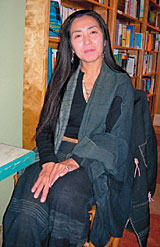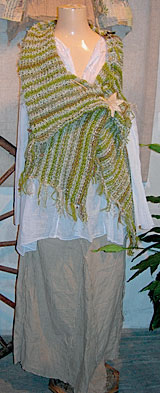
photos by Alli Marshall
Piece of the sky: Little Eagle designer Kaorico Ago.
|
“I don’t want a big business,” says Japanese designer Kaorico Ago when we meet for coffee at a local café. “I just want to keep to important things.”
For the former kimono planner (who lives – when she’s not globetrotting – in Kanagawa, Japan), those important things include her 10-year-old daughter Ryo, her connection to nature and her work toward world peace. And all of these priorities are expressed through her clothing collections, including Little Eagle, a line of natural-fiber and recycled designs currently on display at Ananda Hair Studio.
Here’s your miracle
“Sometimes I see dreams,” Ago explains. Though her English isn’t fluent, her passion is easily expressed across the language barrier.
“You see the designs in your dreams?” prompts her boyfriend – and Little Eagle’s Director of Sales – Peter Wada. “And then you make them when you wake up?”
Ago nods. But there’s more to her clothing collections than nocturnal musings. The business started a decade ago, with the birth of Ago’s daughter. The textile artist crafted a few outfits for her child, and soon friends and neighbors were asking her to sew clothes for their kids. Inspired, she fashioned a few adult items to match the children’s clothing – and these, too, brought in requests.
“Then they wanted the father’s clothes, too.”
Part of what attracts people to the Little Eagle designs are their natural, earth-friendly fabrics and colors. “I like basic and simple, so I try to make with linen or cotton, sometimes silk,” the designer says. “I like hand-stitching and patchwork with very small detail.”
In fact, the end result has elements that may well have evolved from the parking lot of a Grateful Dead show: wide-legged pants with flowing side panels. Crocheted halter tops. Hemp tams. Patchwork skirts and breezy cotton blouses sporting the occasional embroidered peace sign.
At the same time, Little Eagle boasts clean lines reminiscent of such traditional Japanese garments as the Happi (a short coat worn with loose trousers). Each piece is body-conscious and elegant in its simplicity. “Everything looks natural and soft,” Ago says of the greens, beiges and browns she favors for her winter line. Summer items tend toward crisp white and deep indigo – a preppie Ralph Lauren palette re-imagined.
Well-traveled

Pieced natural linen skirt; delicately embroidered cotton blouse; convertible shawl made from Nepalese hemp and wool; wooden lotus-design fastener designed by Ago and crafted in India
|
But instead of basing her travel-friendly line, Reincarnation, on the tanned yachting clique, Ago crafted packable garb with multiple uses for the backpacking set. And forget about the middlebrow coup that is wrinkle-free fabric – each piece, rendered in crinkly cotton and accompanied by its own small bag for storage, is meant to be worn crushed.
“I don’t know why, but Americans like to travel a lot, like the Japanese,” says Wada. The sales director used to own Heiwa Shokudo before embarking on Ago’s current project. Currently, he jets between Hawaii and Weaverville, and likely makes use of the loose, comfortable cotton and linen clothing geared for racking up frequent-flyer miles.
The Reincarnation pieces are reversible and unisex, formal and casual. As we talk, Ago slips an arm through an opening in the deep-blue shawl she’s wearing, demonstrating how it transforms to a loose vest or a poncho – the fluidity perhaps drawn from her other inspiration: the ocean.
“I like beach grass and driftwood,” she says, referring to items she often collects to be woven into clothing or fashioned as buttons.
“When Kaorico makes clothes, she likes to pick up the beach grass and driftwood because they’ve been traveling in the sea, so they feel very pure,” Wada recounts. Then he laughs. “But she [can] only use maybe five [items].”
Eco chic
What began as a one-woman operation now requires the help of knitters and seamstresses. Ago commissions some of her work to sewers in India, though each item continues to be handmade and one-of-a-kind. Still managing to avoid the often environmentally unfriendly practices of the textile industry, Ago focuses on natural fabrics and recycled items. Old kimono materials are incorporated into designs. Pre-worn clothing is shredded and knit into new pieces.
And if the name of Ago’s current collection – Little Eagle – sounds surprisingly Native American, well, it is. The designer was introduced to American Indian spirituality following a personal tragedy. “I liked the philosophy, and started connecting to them,” she says.
For the past 15 years, she’s traveled to Arizona to participate in the Sundance ceremony. And the concept of walking lightly on the earth began to emerge in her work.
“In Japan, people buy clothing and throw it away,” Ago notes. “I wanted to give a [different] message to my daughter.” So she began using cast-off items, styling them into fashion-forward pieces that represent a multitude of cultures and traditions. (For travelers, spiritual seekers and the style-conscious alike, Ago’s creations will be available for purchase at Worthwhile come spring.)
These days, the textile artist’s message isn’t just for her own daughter. “This is for my child, but these clothes are also my children, too,” she says. “Little Eagle [is about] treating everybody like your own child.”
Kaorico Ago’s Little Eagle collection, Walk In Beauty, will show at Ananda Hair Studio (22 Broadway) through Sunday, Jan. 15. Call 232-1017 or see www.little-eagle.net.



Before you comment
The comments section is here to provide a platform for civil dialogue on the issues we face together as a local community. Xpress is committed to offering this platform for all voices, but when the tone of the discussion gets nasty or strays off topic, we believe many people choose not to participate. Xpress editors are determined to moderate comments to ensure a constructive interchange is maintained. All comments judged not to be in keeping with the spirit of civil discourse will be removed and repeat violators will be banned. See here for our terms of service. Thank you for being part of this effort to promote respectful discussion.